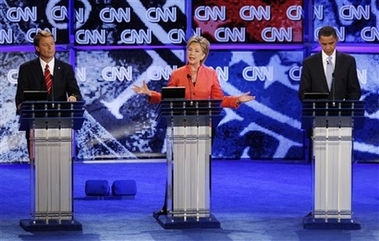Dems struggle with online questions
(AP)Updated: 2007-07-24 09:05
CHARLESTON, S.C. - Democratic presidential hopefuls struggled Monday night to answer questions posed by young, Internet-savvy voters who challenged traditional political labels and the candidates' own place in a broken political system.
The answer was a qualified yes. The candidates faced a slew of blunt questions and, in some cases, responded in kind.
To Sen. Barack Obama of Illinois: Are you black enough? "You know, when I'm catching a cab in Manhattan ... I'm giving my credentials," he replied.
To Sen. Hillary Rodham Clinton of New York: Are you feminine enough? "I couldn't run as anything other than a woman,"
Her answer drew a challenge from former Sen. John Edwards, who said he was the best advocate for women on the debate stage. "I have the strongest, boldest ideas," he said.
The debate featured questions submitted to the online video community and screened by the all-news cable TV network. It was held at the military college of The Citadel in South Carolina, site of one of the earliest primaries - Jan. 29.
Clinton, Obama and Edwards lead in most polls of the Democratic field.
Other candidates got in their licks. Gov. Bill Richardson of New Mexico spoke strongly in support of gay rights. Sen. Chris Dodd of Connecticut promised to "bring people together." Sen. Joe Biden of Delaware said he would send 2,500 US troops to Dafur to try to end the civil war there. "They think we can save them," he said, "Guess what? We can."
It took three tries to get Clinton to answer the same questions. She finally said American ground troops don't belong in the fight because they are overextended in Iraq.
She also refused to call herself a liberal. "I prefer the word progressive, which has a very American meaning," she said.
The opening question challenged Democrats to do better than the failed leadership in Congress and the White House. "How are you going to be any different?" the voter asked.
Obama, a freshmen lawmaker trying to appeal to the public's thirst for change, replied, "One of the things I bring is a perspective ... that says Washington has to change."
Clinton claimed she has a 35-year-record as an agent of change. "The issue is which one of us will be ready from Day One."
The Democratic gathering marked a turning point in political communications. CNN, a landmark all-news cable network when founded 27 years ago, is now part of a media establishment coming to terms with upstarts like the 2 1/2-year-old online video community.
The debate aside, YouTube has already left its mark on politics. Republican George Allen lost his Senate seat and a likely spot in the 2008 presidential race after a YouTube video caught him referring to a man of South Asian decent as "macaca" - an ethnic slur in some countries.
In the presidential campaign, buzz-worthy video clips have included Bill and Hillary Clinton's spoof of "The Sopranos" finale, Edwards' combing his hair to the tune "I Feel Pretty," and a buxom model professing her crush on Obama.
Most of the candidates use social networking tools popularized by YouTube and MySpace.com to draw voters to their sites and create a sense of community. At least two of the Democratic candidates planned to answers supporters' questions on their sites after Monday night's debate.
In the spirit of the era, each candidate was asked to produce his or her own video.
Edwards' video poked fun at the attention paid to his pricey haircuts at the expense of more serious issues. Set to the theme from the 1968 musical "Hair," the video opens with several closeup of hairdos, giving way to less frivolous images including several from Iraq. It ends with a white-on-black slide: "What really matters? You Choose"
Clinton's video-ad ended with the kicker, "Sometimes the best man for a job is a woman."
|
|
|
||
|
||
|
|

